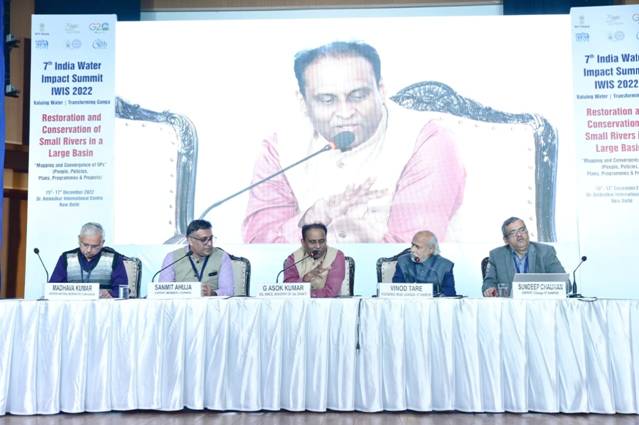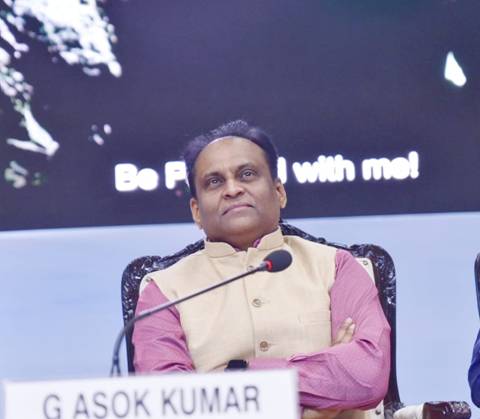Ministry of Jal Shakti
7th edition of India Water Impact Summit Concludes
Posted On:
18 DEC 2022 1:31PM by PIB Delhi
The 7th edition of the India Water Impact Summit concluded on 17th December 2022 after 3 days of fruitful deliberations on important aspects of water conservation and river rejuvenation, with special emphasis on revival of small rivers for the protection of large basins. On the third and final day of the 7th India Water Impact Summit, experts from water, environment and administrative sectors unanimously consented to an urgent need of forming a National River Framework in the country, which would determine the parameters for monitoring river health, process and responsibility. All experts were unanimous that the direction of river health cannot be ascertained based on only biochemical parameters. Condition of aquatic life present in river can be an indicator of river health. In this process, the indigenous species of aquatic life must be included rather than the exotic species which have been developed in the river for commercial purposes.
- DG, NMCG presides over the valedictory session of the 7th Edition of India Water Impact Summit
- Consensus over need to form a National River Framework among all stakeholders
- A strong need to establish a system for exchange of official information in water-related issues felt
- DG, NMCG emphasized on ground implementation of the findings
The valedictory session was presided over by Shri G. Asok Kumar, Director General, National Mission for Clean Ganga (NMCG). Prof. Vinod Tare, cGanga moderated the session. DG, NMCG re-emphasized to shift the focus to implementation and hoped that by next positive changes would be seen on ground. “The deliberations have enabled us to identify the areas we have to work upon. Now, it is time to implement and see results on ground.” He said that water in India has come of age and in the past 6-7 years, there has been better awareness on water related issues in the country. “Water is crucial for the existence of mankind and is finally getting the respect and value it deserves,” he said, adding, “We all can see that, now, a lot of focus is on water-related issues even at the district administration level which was not the case about a decade ago.”
He said that Namami Gange has taken the lead in water management, circular economy, resource recovery, ensuring rivers are not polluted, and take initiatives such as river-city alliance that are central to include protection of rivers at the urban planning level. He also noted that with NMCG’s initiative, water is now being looked at as a resource for increasing GDPs of local districts through tourism, healthcare, etc.
Commenting on the theme of this year’s India Water Impact Summit, Shri Kumar said that, rightly, a lot of discussions took place on revival of small rivers which is crucial to rejuvenate large basins. He also emphasized on the need to break silos and view water as one resource. “Water has no geographical boundaries and silofication of water needs to be broken down,” he added. He spoke about work being done in the direction of monetization of wastewater and sludge, natural farming, livelihood generation etc. under Arth Ganga to make Namami Gange a self-sustainable model.
Moderating the session, Prof. Tare noted that integration and coordination of sector-wise programmes is as important as the implementation of projects with sector specific knowledge and expertise. The deliberations highlighted that the bottom-up approach (community-driven small river basin committees) with large basin and national level coordination is immensely significant.
On the concluding day of the Summit, Session A3 was centred on the ‘Formulation and Execution of River Monitoring Programmes’. The objective of the session was to determine challenges in river restoration and conservation programmes. Session E2 was on the ‘Impact of Land use on Rejuvenation of Small Rivers’. The session highlighted how the health of the smallest stream has a ripple effect on the next order stream, and is responsible for bringing a rich variety of aquatic biodiversity. The deliberations showed the significance of drafting policies, interventions, and strategies to safeguard the small rivers from adverse effects of poor land-use planning and development. Session A4 was themed on the Information/Data Collation, Utilization and Dissemination Strategy, while Session C5 was on Physical / Hybrid Model.
The sessions also showed that large basin/national level knowledge based organisations should play the leadership role for gathering information about health status of all the rivers in a sustained manner. It was observed that reclamation of resources from wastes and its reuse in restoration and conservation of natural resources (river systems and soils) should be valued and appropriately accounted in economic sense for creating novel financing models/instruments. Moreover, river health needs to be used as an important criterion for evaluating the progress of RRC programmes as well as the status of rivers, instead of the designated Best Use Water Quality criteria. Deliberations were also done on removing the bottlenecks in river restoration. Three main points emerged from discussions today included change in land use, stopping exploitation of ground water, sand mining, and mixing of solid and liquid waste in rivers. In another session, data collection and exchange of information. A need to establish a system for exchange of official information in water-related issues was also strongly felt during the afternoon session.
Representatives of European Union, Norway, Germany and Slovenia participated in the discussion on the international track at the summit. The international participated unanimously agreed to the fact that river and basin management under geographical diversity makes India a natural laboratory of river science. International participants observed that the way work is going on in the direction of river restoration, one can say that India would emerge as world teacher of river science. International representatives stressed that a COP conference on water should also be started on international level. The theme of the 7th India Water Impact Summit (IWIS 2022) is ‘Restoration and Conservation of Small Rivers in a Large Basin’ with emphasis on the select aspects of ‘Mapping and Convergence of 5Ps’ - People, Policy, Plan, Programme and Project….

Figure 1: Shri G. Asok Kumar, Director General, National Mission for Clean Ganga, presided over the valedictory session of the 7th Edition of the India Water Impact Summit on 17th December 2022.

Figure 2: Shri G. Asok Kumar, Director General, National Mission for Clean Ganga at the valedictory session of the 7th edition of the India Water Impact Summit
****
AS
(Release ID: 1884548)
Visitor Counter : 4555